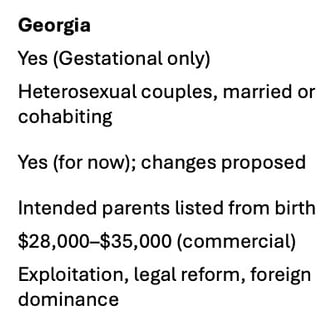Surrogacy Laws in Georgia and Ukraine: What You Need to Know in 2025
In recent years, Georgia and Ukraine have emerged as global hotspots for intended parents exploring surrogacy. Thanks to their supportive legal frameworks and affordable medical care, these two Eastern European countries have welcomed thousands of foreign couples. But as the demand grows, so does the complexity of the legal and ethical landscape. If you’re considering surrogacy in either country—or are just curious about how it all works—this blog breaks down the latest laws, updates, and ethical concerns you need to know.
Surrogacy in the Republic of Georgia
What’s Legal?
Georgia has allowed gestational surrogacy since the early 2000s. Under current laws:
Only heterosexual married or long-term cohabiting couples are eligible.
At least one parent must have a genetic link to the child.
The surrogate has no parental rights and cannot claim custody.
The intended parents’ names go directly on the birth certificate.
This makes Georgia one of the few countries offering clear parental rights from the outset—a big reason why it attracts international clients.
What’s Changing?
With 98% of surrogacy cases involving foreigners, the Georgian government is beginning to question the industry's direction. New legislation has been proposed to:
Ban commercial surrogacy for foreigners.
Allow only altruistic surrogacy for Georgian citizens.
These proposals haven’t become law yet, but they signal a move toward tighter regulation. If you’re thinking about pursuing surrogacy in Georgia, now is the time to act—or at least monitor developments closely.
Ethical Concerns
While intended parents see a lifeline, critics raise serious questions:
Are Georgian women being exploited?
Should surrogacy be a commercial transaction?
What safeguards are in place to protect all parties?
With surrogate compensation ranging between $28,000 and $35,000, it’s a lucrative but controversial opportunity for many.
What’s Legal?
Ukraine also supports gestational surrogacy under national law. Here’s what’s allowed:
Only heterosexual married couples with medical infertility issues can apply.
Surrogates waive all parental rights.
The intended parents are automatically listed on the birth certificate.
Ukraine’s laws are some of the clearest and most supportive in Europe when it comes to surrogacy.
What About the War?
Despite the ongoing conflict with Russia, Ukraine’s surrogacy industry continues to operate, mostly from safer regions like Kyiv and western parts of the country.
Still, new legislation is on the horizon. A draft law introduced in 2023 proposes to:
Ban surrogacy for foreigners during wartime and for three years afterward.
Expand access to same-sex couples—a progressive twist, though not yet passed.
The bill is still under review as of 2025, but the message is clear: change is coming.
Ethical Concerns
War has only intensified concerns around surrogacy in Ukraine:
Babies are being born in conflict zones.
Intended parents struggle to retrieve their newborns amid travel restrictions.
Critics say the system can exploit vulnerable women in a time of national crisis.
A Side-by-Side Comparison
Final Thoughts
For many families, surrogacy is a deeply personal and emotional journey. Georgia and Ukraine continue to offer options—but those options may soon narrow due to political pressure, ethical debates, and national security concerns.
If you’re exploring surrogacy abroad, do your homework, stay updated on legal changes, and consult local experts to guide your decision-making process. The rules may change, but informed choices will always be your strongest ally.


What's New
© 2025. All rights reserved.
